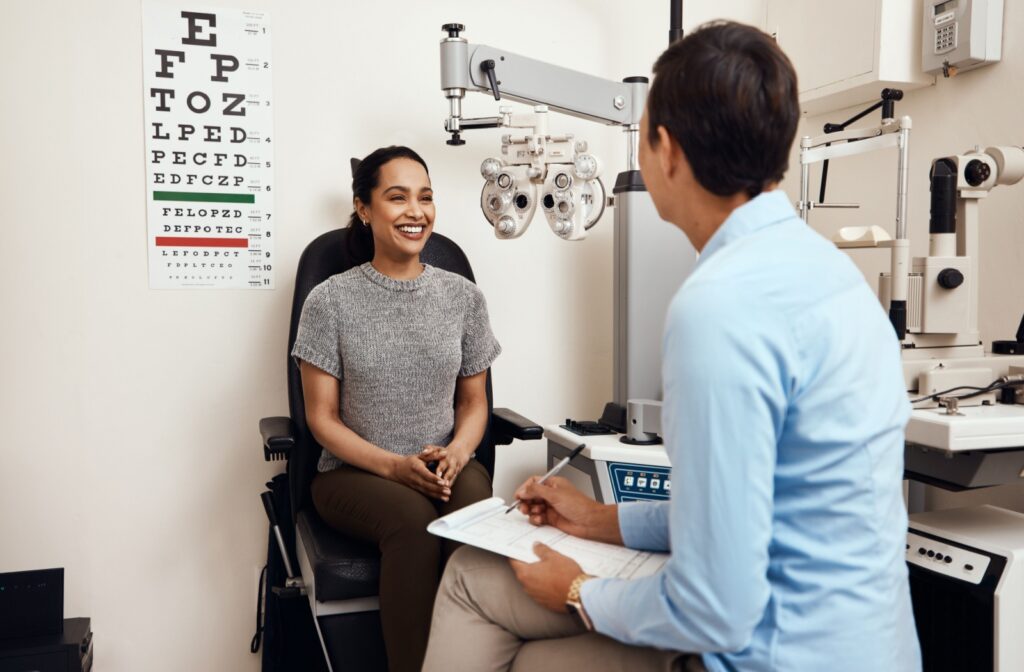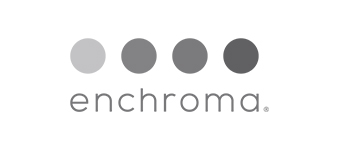Finding an optometrist for your routine eye exam isn’t complicated—but choosing the right one makes a big difference for your eye health. It can be as easy as picking the first clinic that pops up on a Google search. However, the right optometrist makes a big difference for your visual health, so it pays to do a little research beforehand.
Here’s what to look for before booking your exam:
- Education and expertise
- Services provided
- Technology and equipment
- Reviews and referrals
Eye exams are an investment in your overall health and wellness. It all starts with finding the right optometrist.
Who Performs Your Eye Exam?
Optometrists, ophthalmologists, and opticians are all valuable members of your vision team. It doesn’t help that their titles sound so similar, but the training and expertise in each of these professions are nonetheless all distinct.
Optometrists are primary care doctors for your eyes. After completing 4 years of optometry school, they can diagnose and treat many eye conditions, prescribe glasses and contact lenses, and manage certain eye diseases. In other words, most routine eye care falls under their jurisdiction.
Ophthalmologists are medical doctors (OMD) who specialize in eye and vision care. They can perform comprehensive eye exams and prescribe corrective lenses, but they focus more on treating and managing complex eye conditions (cataracts, glaucoma, macular degeneration, etc.). They can also perform surgeries. You might need a referral to an ophthalmologist for certain procedures or treatments.
Opticians are not doctors, but they fit and dispense eyewear based on prescriptions from optometrists and ophthalmologists. They don’t perform eye exams, but are experts in helping you find the perfect frames and lenses.
What to Look for in an Optometrist
If you’re going in for a routine eye exam, an optometrist is the one to see. Most people don’t require the care that ophthalmologists provide. So, if it’s been a while since your last exam or you’re looking to change providers, here are some things to look for in an optometrist:
Education & Expertise
Start by verifying that your potential optometrist is licensed to practice in your province. Look for someone who has completed their Doctor of Optometry (OD) degree from an accredited institution and maintains continuing education requirements. In Canada, optometrists cannot practice without a valid license, but it’s still worth confirming their qualifications.
Here’s where the finer details matter, especially if you have specific concerns. Optometrists are always investing in ongoing education. Some prefer to focus on specific areas of eye care, such as dry eye management or myopia control. If you have particular needs, seek out someone with relevant expertise.
Services Provided
A comprehensive optometry practice should offer more than basic eye exams. Look for practices that provide:
- Comprehensive eye health examinations for all ages
- Contact lens exams and fittings
- Management of eye diseases
- Emergency eye care services
- Specialty services like myopia control or dry eye treatment
Modern optometry practices often use diagnostic equipment to detect eye problems early. This might include digital retinal imaging, optical coherence tomography (OCT), or visual field testing.

Technology & Equipment
The quality of diagnostic equipment can significantly impact the thoroughness of your eye exam. Modern practices invest in advanced technology that allows for more precise diagnoses and better patient care.
Digital retinal cameras can capture detailed images of the back of your eye, helping detect conditions like diabetic retinopathy or macular degeneration before symptoms appear. Automated refraction instruments can provide more accurate prescription measurements, while innovative contact lens fitting tools provide better comfort and vision.
A dedicated optometrist always has their patients’ best interests at heart. Based on the findings of your routine eye exam, they may bring you back for further testing or may refer you to an appropriate ophthalmologist.
Reviews & Referrals
Online reviews can provide valuable insights into other patients’ experiences. Pay attention to comments about wait times, staff friendliness, and the thoroughness of examinations. Keep in mind, reviews reflect individual experiences and may not always match your own.
You can also ask people you know! The word of those you trust often carries more weight than online reviews. Your family doctor might have recommendations, especially if you have health conditions that could affect your eyes.
Why Quality Eye Care Matters
Routine eye exams are about so much more than updating your prescription. They benefit everyone, even if you don’t require the support of corrective lenses. Staying regular with these comprehensive visits allows your optometrist to detect early signs of serious sight-threatening eye conditions.
A skilled optometrist will also consider how your lifestyle affects your vision. They might recommend specialty contact lenses for dry eye, suggest specific eyewear for certain activities, or develop a treatment plan for eye disease management.
The relationship you build with your optometrist can span decades, making it important to choose someone you trust and feel comfortable with.
Taking the Next Step
An eye exam is more than just updating your glasses prescription—it’s a chance to protect your vision and overall health. The right optometrist will not only provide thorough care but also tailor their recommendations to your lifestyle and long-term needs. Building this relationship can give you confidence in your eye health for years to come.
If it’s been a while since your last exam, Stonebridge Eyecare is here to help. Our team combines experience, modern technology, and compassionate care to make vision care simple and effective.
Book your routine eye exam with us today and see the difference for yourself.










